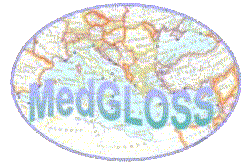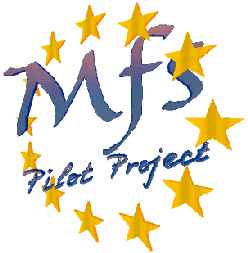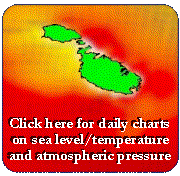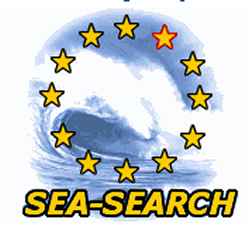 |
| |
| Mission | |
| Meteo-Marine Observations | |
| Numerical Modelling | |
| MedGLOSS Malta Station | |
| International Projects | |
| How To Find Us | |
| Contact Us |

| MedGLOSS | |
| MFSPP | |
| MFSTEP | |
| MEDAR/MEDATLAS II | |
| SEA-SEARCH |
MedGLOSS____

Description of the ProjectMalta MedGLOSS Station MedGLOSS is an IOC/CIESM pilot project that is building an operational sea level monitoring network system for systematic measurements in the Mediterranean and Black Seas. The system is based on the basic GLOSS requirements and methodology, aiming to provide for the first time a high quality standardized data on sea level in near real-time with a coverage along the Mediterranean and Black Sea basins. |
 |
MFSPP____

|
The MFSPP is a project funded under the IV Framework Programme of the EU. MFSPP has demonstarted the feasibility of a Mediterranean operational system for predictions of physical and biochemical parameters in the whole basin and coastal/shelf areas, and for the time scales of weeks to months. The main workpackages focussed on the improvement of the ocean general circulation model for the Mediterranean, with assimilation of real time data. The numerical modelling effort was also aimed t downscale the hydrodynamics from basin to shelf scale through a hierarchy of successively embedded model domains. Ocean forecasts were made by a nowcasting / forecasting modelling system that relies on data |
 |
| assimilation from satellite (sea level anomaly and sea surface temperature) and temperature) and from ocean upper layer temperatures collected by voluntary observing ships. A prototype deep sea buoy was deployed in the Cretan Sea. MFSPP also developed interfaces to user communities for dissemination of forecast results.
|
|
MFSTEP____

The Mediterranean ocean Forecasting System: Toward Environmental Predictions (MFSTEP) Starting in 2003 is a continuation of MFSPP. The aim is to improve monitoring technology to achieve maximum reliability, to demonstrate the feasibility of regional scale forecasting in several Mediterranean areas, to develop biochemical modelling and data assimilation towards environmental predictions and to start the development of end-user interfaces for the exploitation of the project products. The problems addressed are: technological developments for real time monitoring, the provision of protocols for data dissemination, including telecommunication and quality control; scientific development to improve numerical models, the design and implementation of data assimilation schemes at different spatial scales, the ecosystem modeling validation/calibration at the coastal and basin scales and the development of data assimilation techniques for biochemical data; exploitation developments, consisting of software interfaces between forecast products and oil spill modeling, general contaminant dispersion models, relocatable emergency systems, search and rescue models and fish stock observing systems.
MEDAR/MEDATLAS II____

MEDAR/MEDATLAS II, the Mediterranean Data Archaeology and Rescue of Temperature, Salinity and Bio-chemical Parameters
| The objective of the MEDAR/MEDATLAS II project (1998-2001) is to rescue, safeguard and make available a comprehensive data set of oceanographic parameters collected in the Mediterranean and Black Sea, through a wide co-operation of the Mediterranean and Black Sea countries. Bio-chemical observations dispersed in the scientific laboratories |  |
| are compiled, checked for quality, processed to get climatological gridded statistics and distributed through user friendly software tools. |
|
The tasks are co-ordonated within regional and thematic workpackages. It is expected that the resulting database will be of widespread benefit to research, industrial and monitoring programmes of the Mediterranean and Black seas regions. It will also contribute to data management capacity building through enhanced data exchange, workshops and training on quality control, data processing and mapping.
MEDAR/MEDATLAS is a European MAST/INCO concerted action and a regional contribution to UNESCO/IOC Global Ocean Data Archaeology and Rescue (GODAR) project.
SEA-SEARCH____




